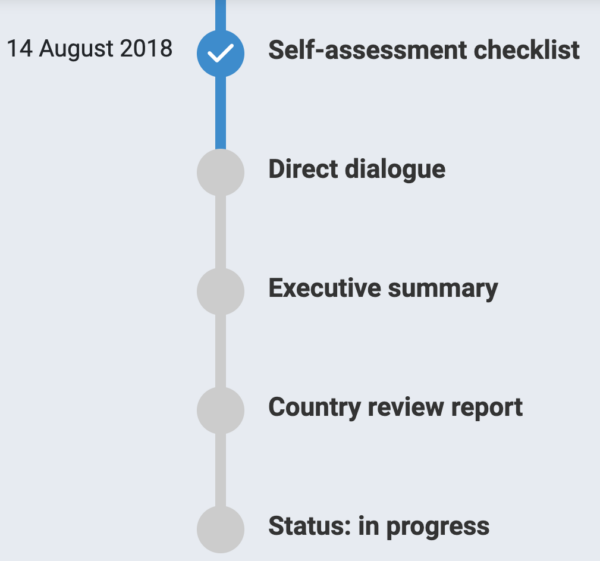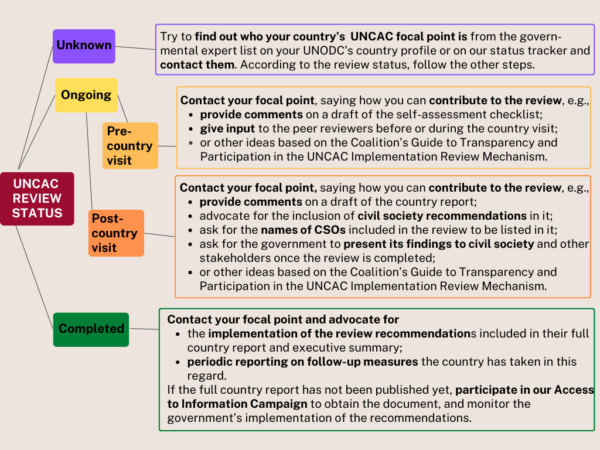1 October 2024 –
The United Nations Office on Drugs and Crime (UNODC), which acts as the UNCAC Secretariat, has recently updated its UNCAC Country Profile pages. These pages contain information on each States Parties’ UNCAC reviews under the 1st and 2nd cycle. After years of advocating for more information to be made public, the new Country Profile pages now reveal some previously unavailable data points. However, other important aspects have been removed.
In this blog post, we explore the improvements and setbacks of these changes, what still needs to be improved, and what both civil society and States can do to make the review process more transparent and participatory.
Improvements
 The Country Profile pages now include updated information on all UNCAC reviews. Previously information was updated late, making it impossible to know where the review process in a given country was actually at. Let’s see how timely future updates will be!
The Country Profile pages now include updated information on all UNCAC reviews. Previously information was updated late, making it impossible to know where the review process in a given country was actually at. Let’s see how timely future updates will be!- They now clearly indicate the sequence of the different steps of the UNCAC implementation review process. It is now clear that the review process steps are the ones that can be seen in the picture.
- This structure now also clearly shows when a review has been completed. Previously, even after the publication of the executive summary, it remained unclear whether a review had been officially completed or not (the full country reports are usually only finalized after the executive summary is published and are only released if the government under review agrees to the publication).
- Dates of completion of the different steps have been added, so it is now visible where States Parties stand in the review process (assuming this information is updated regularly). This has also made visible how delayed many reviews are, with self-assessment checklists of several States Parties having been completed years ago, with no further progress in the reviews to date.
- A section has been added on which States Parties the Country profile pages’ State Party is “Acting as reviewing state for”.
- Two sections on “Compliance with notification requirements” and “Other information” have been better structured, making it clearer where to find the States Parties’ additional reporting on UNODC’s TRACK Portal, UNODC’s central platform of tools and resources for anti-corruption knowledge, which also includes a bibliographic database, and the “Legal Library” which contains national legislation and information on the implementation of the UNCAC.
- A section has been added on “State Party’s profiles on websites of other anti-corruption review mechanisms”, making the much-needed link to similar efforts under regional or other international commitments, like the Council of Europe’s GRECO review, or the FATF reviews.
Setbacks
- The section on “Information on measures taken since the completion of the review” for the 2nd cycle reviews has been removed from the new country profiles pages. Only five States Parties had voluntarily reported on such measures, filling in the gaps for the UNCAC Implementation Review Mechanism’s current lack of a follow-up process. Reinserting this section is especially important to bridge the gap between now and when States Parties decide on how such a formal follow-up mechanism (next phase) should look like (discussions ongoing).
What still needs to be improved?
-
- The current UNCAC focal point and their contact information should be published in a separate field (or be clearly indicated in the governmental experts list), so that non-governmental stakeholders can contact them and express their interest in contributing to the review.
- Upcoming country visit dates should be updated as soon as available, and communicated visibly, for instance, through an announcement panel on newest developments. Not publishing this information ahead of time hinders civil society organizations and other interested parties from reaching out to the focal point and possibly participating in the review.
- All self-assessment checklists and country reports should be published.
- The names and type of “other stakeholders involved in the review” and their contributions should be specified on the country profile pages, as well as in the executive summary and full country report.
- A section that can link to a relevant national government website (where available) with more details on the review process, outcomes and follow-up should be included.
- A section for contributions from non-governmental stakeholders should be added on the country profiles, where civil society parallel reports and other contributions are published, as is the case in other review mechanisms.
- All relevant materials collected during the review process (e.g., laws and policies as well as their translations) should be made available on UNODC’s TRACK portal and linked on the country profile page in a timely manner, not only after the much-delayed reviews are concluded.
- The section on “Information on measures taken since the completion of the review” should be reinserted for all reviews, so that countries which have completed their reviews can show their progress in implementing the recommendations and improving UNCAC implementation at the national level.
What can you do?
- Civil society can find out their country’s UNCAC Review Status on our Tracker map and spreadsheet, and – according to the review status – do the following:

- States should follow the best practice examples listed in our Guide to Transparency & Participation in the UNCAC IRM.



